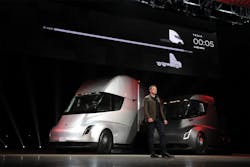How EVs, fuel cells are gaining more ‘alternative’ trucking attention
Tesla’s unveiling of its Class 8 electric semi truck in November was the latest jolt forward for the growing electrification movement. In recent years, existing and start-up manufacturers have begun rolling out fully electric and fuel cell vehicles for various applications as more fleets look for alternatives to diesel fuel.
“In the next decade, you will start to see certain market shifts to electric,” though major hurdles on battery life and weight still need to be solved, said Todd Mouw, vice president of sales and marketing with Roush CleanTech.
Chris Nordh, senior director of advanced vehicle technologies and global fuel products for Ryder System, noted there is a lower barrier to entry for fleets to implement a handful of electric vehicles. Those vehicles generally do not run too many miles a day and can be charged at a central location at night.
Ryder, long involved with the natural gas market, has developing relationships with multiple makers of electric vehicles. It has ordered all-electric delivery vans from Chanje and is the exclusive U.S. sales and lease partner for the company.
Ryder is also the primary distributor and provider of service and support for Workhorse Group’s light- and medium-duty electric vehicles in North America. W.B. Mason in October announced it would lease several of the E-Gen vehicles through Ryder that will be deployed during 2018.
Another pact Ryder made was with start-up Nikola Motor Co. That company said it is developing the Nikola One, a hydrogen fuel cell semi-truck. The company also said it plans to build a fueling network of over 350 hydrogen stations.
Kenworth Truck Co. has recently shown a hydrogen fuel cell tractor that is being developed to haul freight from the Southern California ports to nearby warehouses.
Hydrogen fuel cells have become an attractive technology because the hydrogen powers an electric motor, and the only emission out of the tailpipe is water.
“We see future customers asking us for more than [compressed natural gas] or [renewable natural gas],” he said. “We need to make sure we stay one step ahead,” Bill Cashmareck, managing director of Trillium CNG, said.
In response, Trillium recently said it was expanding offerings and will design, build, and maintain hydrogen-fueling stations. Its new services also include electric vehicle charging infrastructure and solar panel installation. The company will begin construction on its first hydrogen fueling station for fuel-cell electric buses this summer for the Orange County Transportation Authority’s facility in Santa Ana, CA.
About the Author
Neil Abt
Neil Abt is a former FleetOwner editor who wrote for the publication from 2017 to 2020. He was editorial director from 2018 to 2020.
